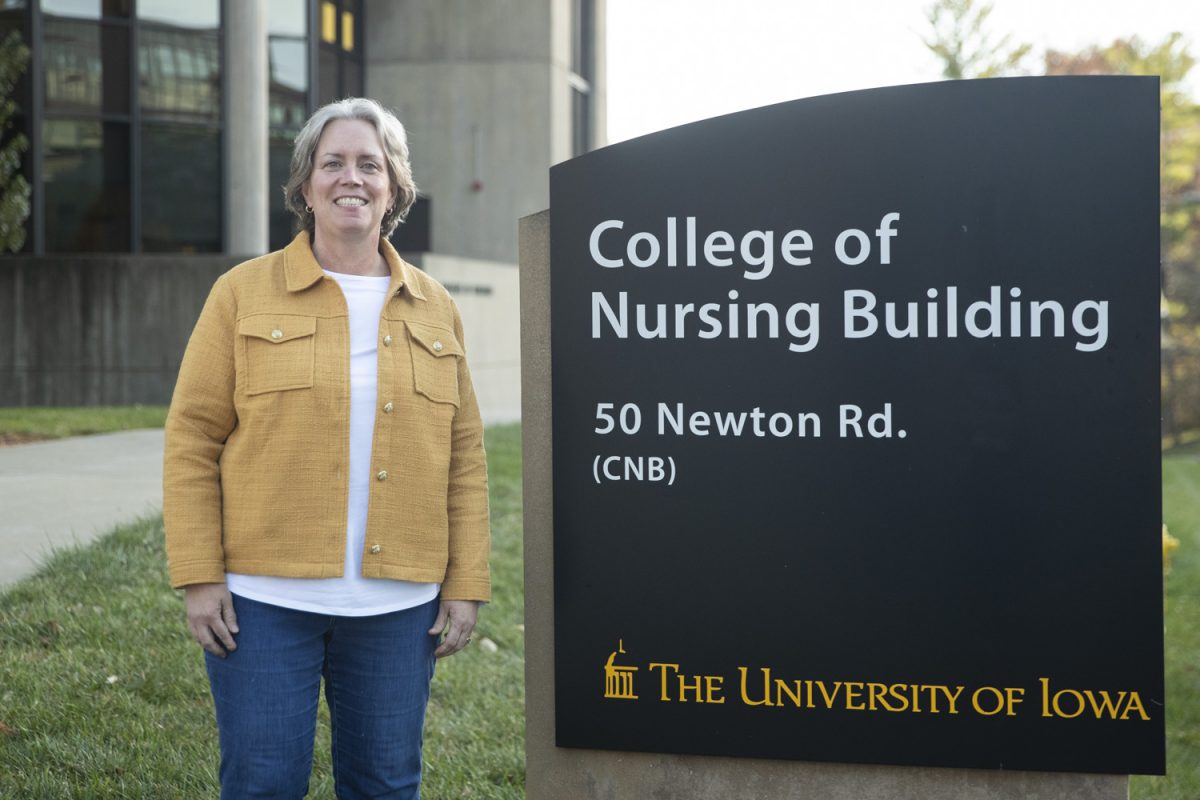Former Army nurse turned University of Iowa family and psychiatric nurse practitioner Teresa Judge-Ellis has dedicated a great deal of her time and talents to addressing mental health and the primary care of people with serious mental illness.
A Mental Health America study showed that 25.4 percent of Iowans with any mental illness reported an unmet need for required treatment in 2022, compared to the U.S. at 28.2 percent.
While Judge-Ellis did not originally plan to go to school for nursing, several of her peers at St. Louis University were nursing majors and eventually influenced her decision to switch to nursing.
After declaring her nursing major, Judge-Ellis took an Army ROTC scholarship to help her pay off nursing school, after which she became an Army officer in the Army Nurse Corps. Over the course of the next four years, she spent time working in general surgical postoperative wards and emergency departments in Augusta, Georgia, Honduras, and Korea.
After leaving the military, she obtained her master’s degree from Pacific Lutheran University before becoming a nurse practitioner at the VA Hospital in Iowa City.
Judge-Ellis has been on staff at UI since 1999, where, as a dual board-certified family practice and psychiatry mental health nurse, she focuses on serving people with mental illness and underserved populations.
She does most of her work with patients at Shelter House and Chatham Oaks, a residential care facility for people with severe mental illness who are in the process of stabilization and transitioning to community living, as a part of the College of Nursing Faculty Practice. On Wednesday mornings, she also brings nursing students to a free breakfast at Agape Cafe, where they have a nursing outreach table set up.
“Tess listened to one of her patients, checked out the Agape Cafe, and started a program with the UI nursing students of Health Education Outreach at Agape in 2022 that is still going strong,” Agape Cafe Co-Director Jennifer Britton wrote in an email to The Daily Iowan. “Her basic brilliant idea is that the more different people students get to meet during their education, the better they will be at taking health histories throughout their careers. Genius!”
Judge-Ellis’ inspiration for her current focus came from external donors to the College of Nursing who supported holistic care and working with underserved populations.
“I was interested in working with people who had a hard time getting in to see their health care provider or a doctor,” she said. “That led me to relationships with people in the community that were doing that sort of work. It seems that severe mental illness and substance use disorder [and] housing instability all kind of coalesced, and that’s where I found myself in those practices.”
Judge-Ellis said the holistic approach is often driven by what the patient has.
RELATED: Iowa established as top nursing school in national rankings – The Daily Iowan
“So, if they come in and their mental illness is stable, but they have a problem with their knee or with their breathing or diabetes, then I will kind of let the patient’s needs drive the appointment,” she said.
She also works closely with case managers and social workers, as they can help address the concerns they see from working with the patient more often and bring them to Judge-Ellis’ attention.
“I can look at people through a lens of both psychiatry and primary care,” she said.
Her work is different than working in a clinic situation, she said, as it is more community-based.
“Because these are populations that sometimes have a hard time engaging with health care, anytime I can get somebody to come in and engage with me and work on health care-related issues that are important to them, that’s a win.”
Chatham Oaks Administrator Lydia Olson-Kelley said Judge-Ellis conducts a clinic every Tuesday to address the residents’ primary care and psychiatric needs.
“For many people that we provide services to, their mental health needs and some of their physical health needs are so intertwined that having someone who can take a look at both provides better outcomes,” Olson-Kelley said. “That’s kind of Tess’ whole philosophy — she wants to help advocate for that to be the norm instead of an exception that she does.”
Olson-Kelley said Judge-Ellis displays an abundance of empathy in her work and is excellent at being open to the ideas and perspectives of others, helping them support people with chronic mental health needs.
“I’m really grateful to have somebody in a partnership with me to really keep us moving forward to make the mental health services more innovative and supportive,” she said.
Judge-Ellis said she hopes her work encourages others to think about nursing in a new light.
“We always think about nursing as working in the hospital, [but] we need nurses to work in the community-based settings too,” she said. “Nursing is just a phenomenal career, and people can start in nursing as a CNA, they can work as an LPN, but the nursing profession is so vast and wide.”



